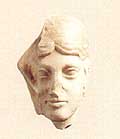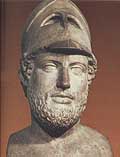The Goverment
How city states grew up
Rulers in Mycenaean times often built their palaces in high places which could be
defended easily. People settled inside the walls. These settlements grew into towns and
then cities, spreading beyond the original walls. New walls were built to enclose them. By
Classical times Greece was divided into many city states, each consisting of a city and
the countryside and villages around it.
Types of goverment
 In
Mycenaean times, the states of Greece were ruled by kings, assisted by their nobles. By
about 800 BC, most of the kings were replaced by oligarchies, small groups of aristocrats.
Many people felt their needs were ignored by the oligarchs, so they helped tyrants (men
who ruled single-handed) to gain power. Some tyrants were good rulers, but others were
cruel and unjust. By the beginning of the Classical period, tyrants were replaced by
democracies. In a democracy, all citizens have a say in the goverment. In Ancient Greece
only men could be citizens. The states were small, so most men were able to attend
meetings and were encouraged to take an active part in politics. The word politics comes
from the Greek word polis, meaning city.
In
Mycenaean times, the states of Greece were ruled by kings, assisted by their nobles. By
about 800 BC, most of the kings were replaced by oligarchies, small groups of aristocrats.
Many people felt their needs were ignored by the oligarchs, so they helped tyrants (men
who ruled single-handed) to gain power. Some tyrants were good rulers, but others were
cruel and unjust. By the beginning of the Classical period, tyrants were replaced by
democracies. In a democracy, all citizens have a say in the goverment. In Ancient Greece
only men could be citizens. The states were small, so most men were able to attend
meetings and were encouraged to take an active part in politics. The word politics comes
from the Greek word polis, meaning city.  In Athens, an
assembly was held three or four times a month. All citizens could attend, speak and vote
on goverment policies. Poor citizens were paid a day's wage to attend the assembly. This
was to enable them to take an active part in goverment. Wealthy citizens were expected to
make extra contributions to the state, such as paying for warships, or a new play at the
theatre. Pericles, a popular politician was re-elected in Athens every year between 460
and 430 BC. To keep check on officials, there was a system called ostracism. Citizens
wrote the names of officials they disapproved of on ostraca, pieces of broken pottery. If
a certain number of people voted against an official in this way, he was banished from
Athens for ten years.
In Athens, an
assembly was held three or four times a month. All citizens could attend, speak and vote
on goverment policies. Poor citizens were paid a day's wage to attend the assembly. This
was to enable them to take an active part in goverment. Wealthy citizens were expected to
make extra contributions to the state, such as paying for warships, or a new play at the
theatre. Pericles, a popular politician was re-elected in Athens every year between 460
and 430 BC. To keep check on officials, there was a system called ostracism. Citizens
wrote the names of officials they disapproved of on ostraca, pieces of broken pottery. If
a certain number of people voted against an official in this way, he was banished from
Athens for ten years.
 In
Mycenaean times, the states of Greece were ruled by kings, assisted by their nobles. By
about 800 BC, most of the kings were replaced by oligarchies, small groups of aristocrats.
Many people felt their needs were ignored by the oligarchs, so they helped tyrants (men
who ruled single-handed) to gain power. Some tyrants were good rulers, but others were
cruel and unjust. By the beginning of the Classical period, tyrants were replaced by
democracies. In a democracy, all citizens have a say in the goverment. In Ancient Greece
only men could be citizens. The states were small, so most men were able to attend
meetings and were encouraged to take an active part in politics. The word politics comes
from the Greek word polis, meaning city.
In
Mycenaean times, the states of Greece were ruled by kings, assisted by their nobles. By
about 800 BC, most of the kings were replaced by oligarchies, small groups of aristocrats.
Many people felt their needs were ignored by the oligarchs, so they helped tyrants (men
who ruled single-handed) to gain power. Some tyrants were good rulers, but others were
cruel and unjust. By the beginning of the Classical period, tyrants were replaced by
democracies. In a democracy, all citizens have a say in the goverment. In Ancient Greece
only men could be citizens. The states were small, so most men were able to attend
meetings and were encouraged to take an active part in politics. The word politics comes
from the Greek word polis, meaning city.  In Athens, an
assembly was held three or four times a month. All citizens could attend, speak and vote
on goverment policies. Poor citizens were paid a day's wage to attend the assembly. This
was to enable them to take an active part in goverment. Wealthy citizens were expected to
make extra contributions to the state, such as paying for warships, or a new play at the
theatre. Pericles, a popular politician was re-elected in Athens every year between 460
and 430 BC. To keep check on officials, there was a system called ostracism. Citizens
wrote the names of officials they disapproved of on ostraca, pieces of broken pottery. If
a certain number of people voted against an official in this way, he was banished from
Athens for ten years.
In Athens, an
assembly was held three or four times a month. All citizens could attend, speak and vote
on goverment policies. Poor citizens were paid a day's wage to attend the assembly. This
was to enable them to take an active part in goverment. Wealthy citizens were expected to
make extra contributions to the state, such as paying for warships, or a new play at the
theatre. Pericles, a popular politician was re-elected in Athens every year between 460
and 430 BC. To keep check on officials, there was a system called ostracism. Citizens
wrote the names of officials they disapproved of on ostraca, pieces of broken pottery. If
a certain number of people voted against an official in this way, he was banished from
Athens for ten years.